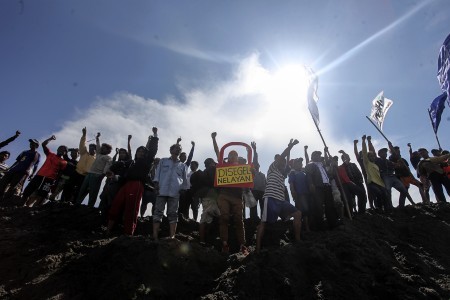Popular Reads
Top Results
Can't find what you're looking for?
View all search resultsPopular Reads
Top Results
Can't find what you're looking for?
View all search resultsReclamation project the answer to Jakarta Bay pollution woes: Ahok
Change text size
Gift Premium Articles
to Anyone
T
he reclamation project is the answer to Jakarta Bay’s pollution woes as the mega project would help restore contaminated water and fix the environment of the capital's coastal areas, Governor Basuki "Ahok" Tjahaja Purnama said on Monday.
The city administration has conducted discussions with the Director general for coastal and small islands at the Maritime Affairs and Fisheries Ministry, Sudirman Saad, on the mega project consisting of 17 man-made islets off the coastal area of Jakarta, Ahok claimed.
The discussion resulted in the conclusion that reclamation was the answer for the heavily polluted waters of the Jakarta bay, Ahok added.
“Reclamation is not prohibited. Sudirman is the person who taught me that if the bay has been polluted, the technique to fix it is by reclamation to absorb the toxicity. There’s a book about it, just ask him,” Ahok told journalists at City Hall on Monday.
A joint Jakarta administration, Maritime Ministry and Coordinating Maritime Affairs Ministry meeting on Monday afternoon will discuss the continuation of the controversial project, especially issues relating to permit issuance.
Maritime Affairs and Fisheries Minister Susi Pudjiastuti said on Friday she asked Ahok to halt the reclamation projects. Acknowledging that authority over the projects remained with the Jakarta governor, Susi reminded the city administration to fulfill all the requirements and acquire recommendations from her ministry before proceeding.
The project, which will add 5,100 hectares, half the size of Bogor city, to Jakarta’s total area, would benefit all Jakartans as long as the city administration acquired the 15 percent contribution from developers, Ahok said.
From the 17 planned islets, eight have already acquired permits and began construction.
Ahok's statement is in contrast with environmental experts and activists who believe that the reclamation project threatens the Jakarta Bay environment.
Chairman of the Indonesian Traditional Fishermen's Association (KNTI) Riza Damanik said the toxic sediment in Jakarta Bay would enter the sea during the construction of the reclaimed islets.
This would worsen the water pollution in Jakarta Bay as the reclamation project would harm the sea biota as well as the residents of coastal areas, especially poor fishermen.
Furthermore, the other coastal areas in Banten province, where developers are taking the sand from, would also suffer environment degradation from sand dredging, Riza said.
"The Jakarta administration must stop the reclamation project and address the environmental damage that has occurred as a result of the reclamation,” Riza said in a discussion on the reclamation project on Friday.
The KNTI also pointed out flaws in the environmental analysis documents (Amdal) and strategic environmental assessment (KLHS) issued by the city administration.
The group urged the administration to completely halt the project, saying it threatened the livelihoods of thousands fishermen who lived along the coast.
According to KNTI speakers at the discussion, around 17,000 fishermen families had been the victims of the construction of islets C, D, and G, and the average fisherman’s income had dropped to Rp 30,000 (US$2.27) per day from the previous level of at least Rp 300,000. Reportedly, fishermen can now only catch 50 kilograms of fish, a stark contrast to their previous 1 ton catches.
"Reclamation has impoverished the fishermen. Traditional fishermen must also sail further, because the area that they previously used to catch fish has been turned into the islets," Riza said.
In a trial at the Administrative Court (PTUN) against the reclamation, KNTI alleged PT Muara Wisesa Samudra, a subsidiary of property giant Agung Podomoro Group, that acquired the permit to develop Islet G, to forging fishermen's signatures when completing their Amdal documents.
Moreover, KNTI also slammed the city administration for failing to include information about the environmental supporting capacity in the KLHS such as the increased need for clean water, energy, transportation and waste disposal.
Indonesian Legal Aid Foundation (YLBHI) public attorney Wahyu Nandang urged the city administration and central government to focus on the livelihoods of the fishermen and not just the their own profit.
The public must be at center of the project, he continued, adding that YLBHI would closely monitor the deliberations of reclamation bylaws once the discussions started.
"So there won’t be any ‘law smuggling’ during the process,” Wahyu said referring to deliberations on the Jakarta coastal spatial planning bylaws that have been plagued with controversy since the a corruption case involving city councilor Mohammad Sanusi and the Agung Pomodoro Group came to light. (rin)










